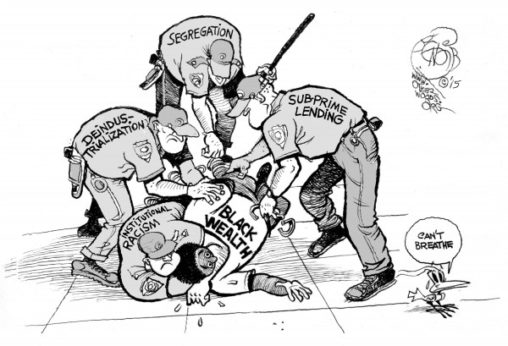
Editor’s Note: This is a repost of a People’s World article that originally ran on June 19, 2017.
On June 19, 1865, Union soldiers arrived in Galveston, Texas. They carried some historic news: Slavery had finally and completely ended, they declared. All of America’s enslaved people were now free, some two-and-a-half years after President Lincoln’s Emancipation Proclamation.
That day in June would soon become “Juneteenth,” a holiday still celebrated in communities across the United States.
African Americans have now been free from slavery for over 150 years. Over the course of those years, the United States has made some appreciable and even impressive progress. In 1964, passage of the Civil Rights Act toppled Jim Crow. A year later, the Voting Rights Act challenged discriminatory voting laws.
We’ve even seen the election – and re-election – of the nation’s first black president.
So why, amid all this progress, does the Juneteenth holiday still resonate so powerfully for so many Americans?
Because Juneteenth reminds us how far we have yet to go. Racial inequality remains one of the top issues of our time. Black households, research shows, continue to lag economically behind their white counterparts, in both income and wealth.

Last summer, the Institute for Policy Studies and the Corporation for Enterprise Development explored that inequality in a report called the The Ever-Growing Gap, which focused on the essential role wealth plays in achieving financial security and opportunity.
Over the past 30 years, the report found, the average wealth of white families grew at three times the rate of growth for black families. If those trends continue, black families would have to work another 228 years to amass the amount of wealth white families already hold today.
That’s almost as long as the 245 years that legal slavery stained colonial America.
Over the course of those years, slave labor built the backbone of America’s economy – and gave white families a 245-year head start on building household wealth and overcoming economic insecurity.
Juneteenth helps us remember this history – and we need to remember.
The conventional narrative around wealth building in America simply ignores slavery and its aftermath. Those with more than ample wealth, the narrative goes, fully merit what they have. And others merit less.
“Most people look at the story of inequality through the lens of deservedness: People get what they deserve,” writes my colleague Chuck Collins in his book Born on Third Base.
The standard narrative, he says, implies “that people are poor because they don’t try as hard, have made mistakes, or lack wit and wisdom.” And the rich, the same story goes, have worked “harder, smarter, or more creatively.”
This “deservedness” narrative never acknowledges the discrimination and other barriers that have blocked black economic progress, or the public policies that have kept these barriers intact – things like housing and employment discrimination, mass incarceration, and tax policies that favor the wealthy over poor people of all colors.
It’s time to take a close look at federal policies and the role they play in keeping the growth of black wealth stagnant. This Juneteenth, let’s rededicate ourselves to closing the racial wealth divide.
Distributed by OtherWords.org.










